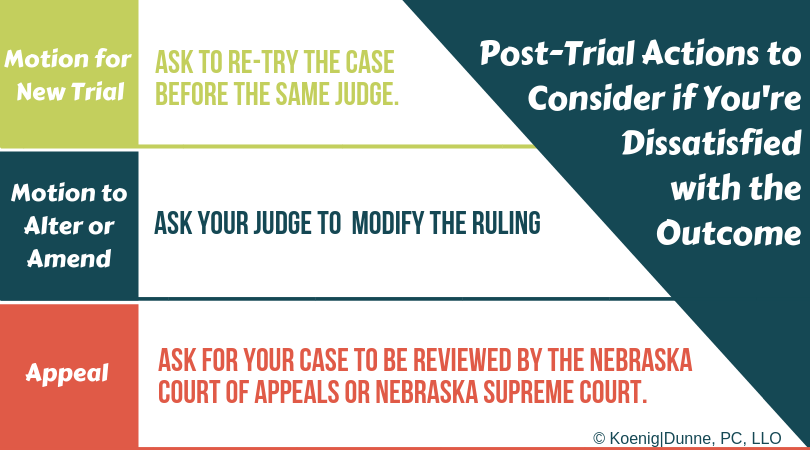Throughout the divorce process, you or your attorney may have disagreed with some of the rulings the judge made. The following are the most common post-trial actions to consider if your case proceeded to trial and you believe the judge erred in the final decision.
Motion for New Trial
After your trial is complete and you have received the judge’s ruling, you may file a motion for new trial. A new trial is a reexamination in the same court (same judge) of an issue or fact after the court has made its decision. If the new trial is granted, the initial decision is vacated, as if it never happened, and a new trial will be held.
There are multiple reasons a Motion for New Trial may be filed, including:
- There was an error committed in the trial/litigation process;
- The decision that was reached by the judge was not sustained by the evidence or is contrary to the law;
- Accident or surprise, which could not have reasonably been guarded against; and/or
- There has been newly discovered evidence that was not reasonably discoverable before trial, which may have a material impact on the ultimate outcome of the case.
You must file this motion no later than 10 days after the judge issued the ruling. Your Koenig│Dunne attorneys can provide a recommendation as to whether filing a Motion for New Trial is advisable.
Motion to Alter or Amend
An alternative to filing a motion for a new trial is to ask the court to alter or amend, or possibly vacate, its order. Your judge may vacate or modify its own orders if:
- Your spouse committed fraud in obtaining the ruling; or
- There has been newly discovered evidence that was not reasonably discoverable before trial, nor could have been discovered with reasonable diligence in time to move for a new trial.
The district court has the power to vacate or modify its orders during the term of the court (which is generally January 1 – December 31), or it may also be exercised after the term upon a motion filed within six months after entry of the orders.
Seek advice from your Koenig│Dunne attorneys promptly if you wish to have your decree altered or modified.
Appeal
If you are interested in having a higher court review your judge’s decision, you may file an appeal. An appeal of the district court’s order goes to the Nebraska Court of Appeals where it is heard before a panel of three appellate court judges. In some cases, the Nebraska Supreme Court may review your case.
Appeal deadlines are strict. If you want to file an appeal, a notice of intent to appeal must be filed no later than 30 days after the Decree was entered, unless you have filed either of the motions discussed above.
If it is your intention to appeal the orders in your decree, contact your Koenig│Dunne attorneys at once to be advised of the proper procedure and your rights. If you do not adhere to the deadlines, you waive your right to appeal.

